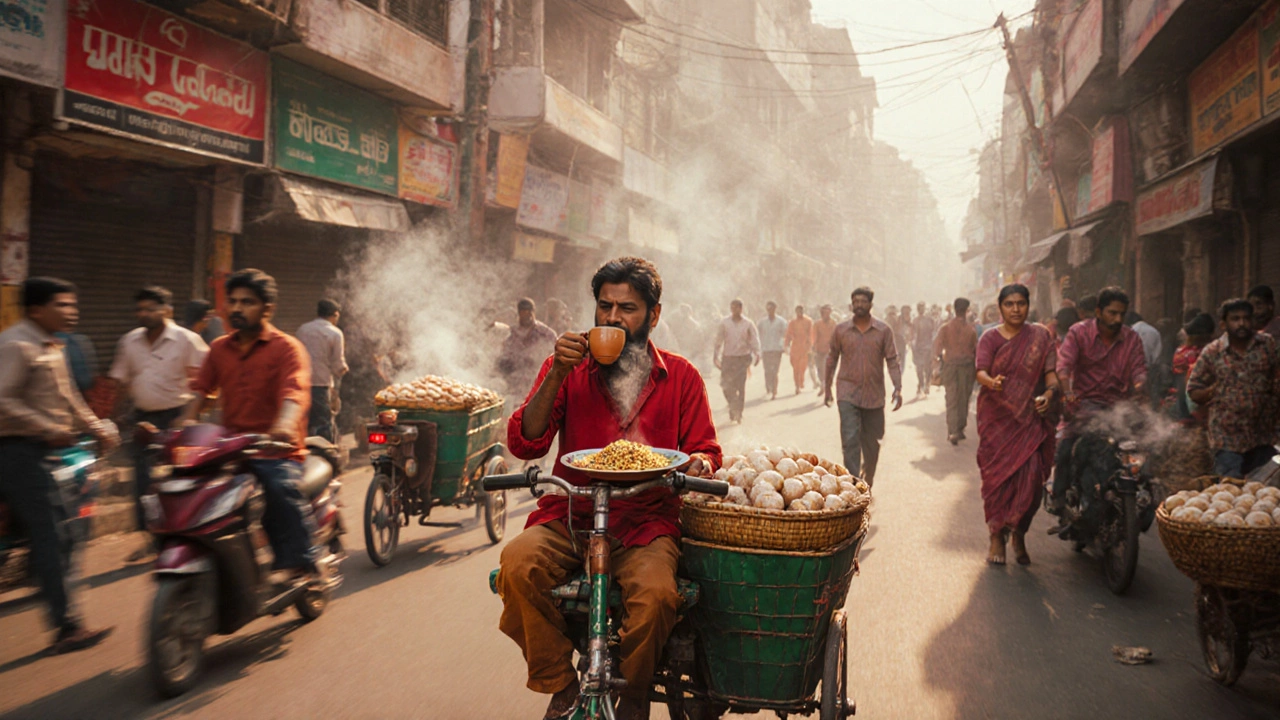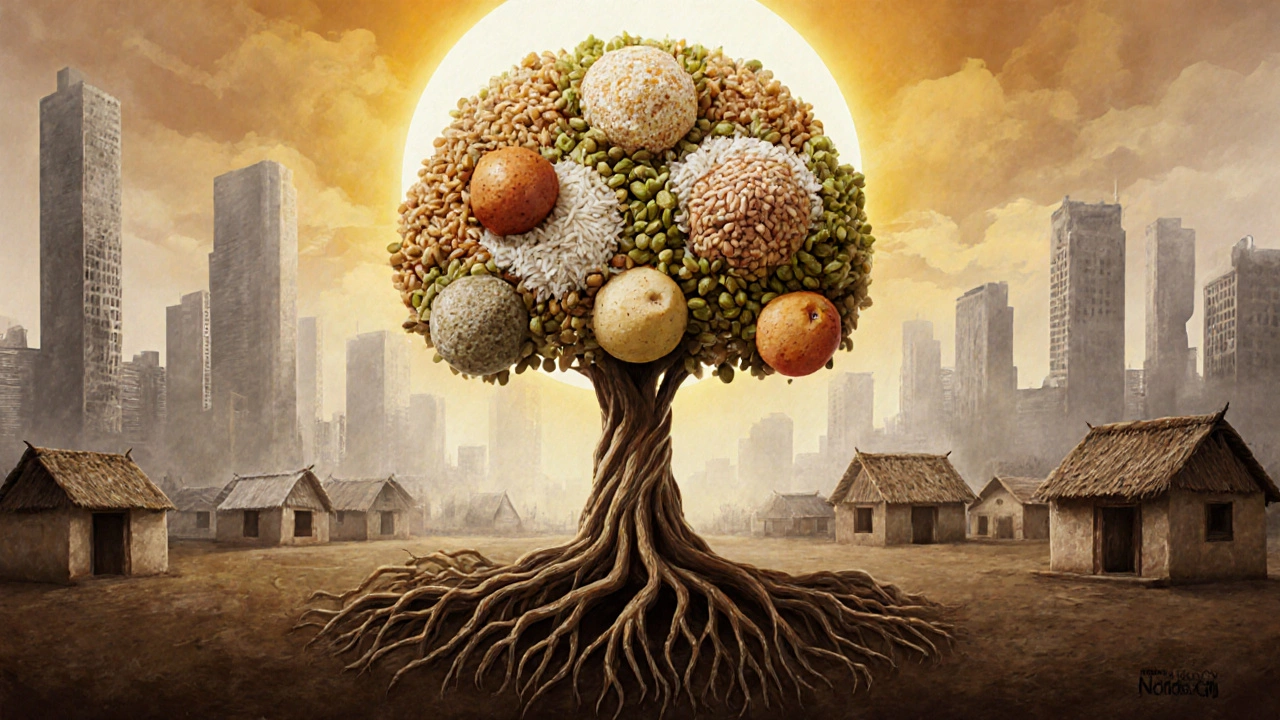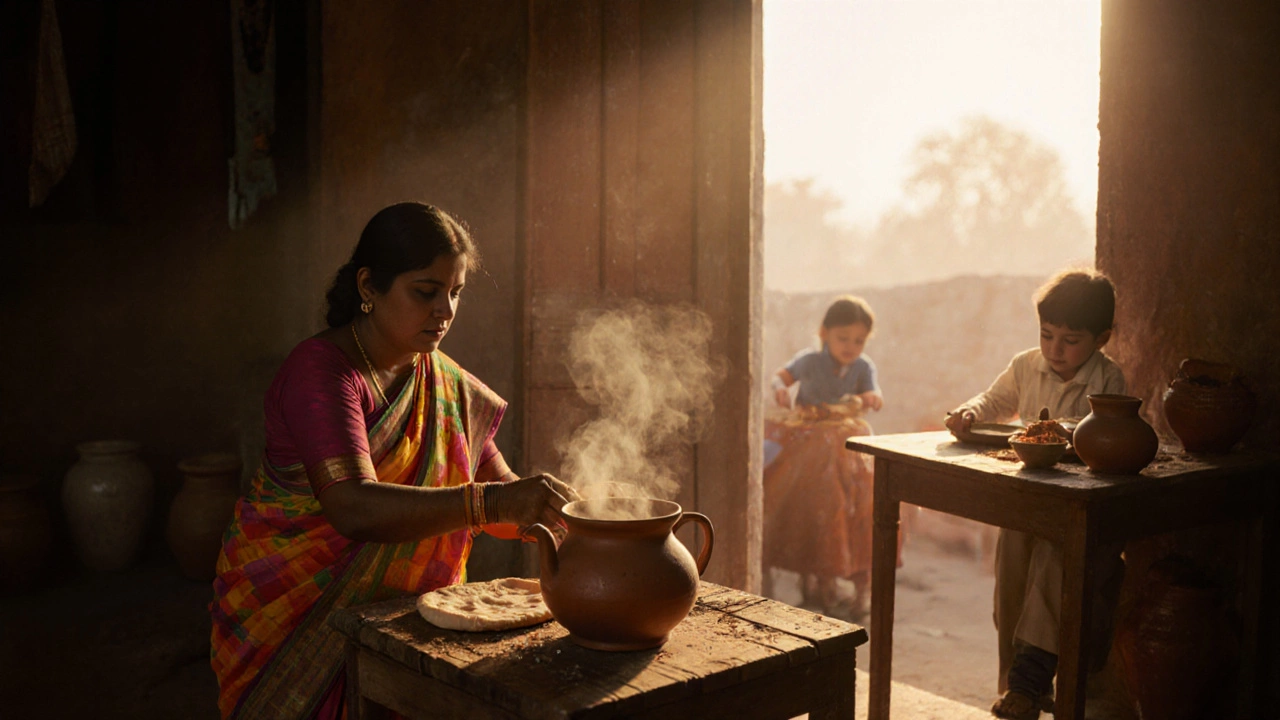Quick Indian Breakfast Advisor
Your Breakfast Situation
For millions of Indians, breakfast isn’t just a meal-it’s the rhythm that sets the day in motion. In cities like Mumbai and villages in Bihar, the smell of hot parathas, the hiss of idlis steaming in bamboo baskets, or the rich aroma of masala chai rising from a clay kettle isn’t just about hunger. It’s culture, routine, and survival rolled into one. But why does breakfast hold such weight in India, more than in many other countries?
Energy for a Long Day
Most Indians start their day before sunrise. Farmers are in the fields by 5 a.m., rickshaw pullers are on the streets by 5:30, and office workers in Delhi or Bengaluru are catching the 7 a.m. train. These aren’t jobs with 9-to-5 flexibility. They demand physical endurance and mental focus from the moment you wake up.
A study from the Indian Council of Medical Research in 2023 found that children who skipped breakfast in rural schools showed a 22% drop in concentration during morning lessons. Adults who skipped morning meals reported higher fatigue levels by midday-especially those in manual labor or service jobs. In India, where the average workday runs 9-10 hours without a long lunch break, breakfast isn’t optional. It’s fuel.
It’s Not Just Calories-It’s Nutrition
Western breakfasts often focus on protein and carbs: eggs, toast, cereal. Indian breakfasts? They’re balanced by tradition. A plate of upma with peanuts and curry leaves gives you complex carbs, healthy fats, and fiber. A bowl of poha with lemon and mustard seeds delivers iron, vitamin C, and slow-digesting carbs. Even a simple bowl of khichdi-rice and lentils cooked together-is a complete protein source, something even modern nutritionists praise.
Unlike processed Western cereals loaded with sugar, most traditional Indian breakfasts are made fresh daily. They’re low in added sugar, high in fiber, and packed with spices like turmeric and cumin that have anti-inflammatory properties. In a country where over 20% of adults are pre-diabetic, according to the Indian Journal of Medical Research (2024), this matters. A morning meal of whole grains and legumes helps stabilize blood sugar better than a croissant or sugary yogurt.
Cultural Identity and Family Bonds
Breakfast in India isn’t eaten alone. It’s shared. In a Punjabi household, the mother wakes up at 4 a.m. to knead dough for parathas while the father boils milk for chai. The kids help set the table. In a Tamil home, the grandmother prepares idlis the night before, steaming them at dawn. This isn’t just cooking-it’s ritual.
These routines pass down knowledge. Children learn which spices balance digestion, how to tell if dosa batter has fermented right, or why jaggery is better than sugar for morning energy. In urban apartments where families are smaller, breakfast is often the only meal everyone eats together before rushing out. It’s the one time of day when phones are put down, and real conversation happens.

Quick Breakfasts Are the New Normal
Not everyone has time to make chana chaat or poha from scratch. But even quick Indian breakfasts are smarter than Western fast food. A packet of roasted chana (chickpeas) with a banana? That’s protein, fiber, and potassium. A bottle of buttermilk with a handful of roasted peanuts? Calcium, probiotics, and healthy fats.
Urban India has seen a rise in ready-to-eat breakfast packs: microwaveable idli-dosa kits, pre-cooked dal parathas, and cold-pressed oat bars with jaggery and flaxseed. These aren’t junk food-they’re adaptations. Companies like Bagrry’s and Nutriorg now sell breakfast mixes with millet, ragi, and moringa, backed by nutritionists. Even convenience is rooted in tradition.
What Happens When You Skip It?
Skipping breakfast in India doesn’t mean you’ll feel a little hungry. It means you’ll crash harder.
Students miss school exams because they can’t focus. Factory workers make mistakes that lead to injuries. Office workers reach for sugary snacks by 11 a.m., leading to weight gain and insulin spikes. A 2024 survey of 12,000 urban Indians found that those who skipped breakfast were 37% more likely to develop metabolic syndrome.
And it’s not just physical. Mental health takes a hit too. A study from AIIMS Delhi showed that people who regularly skipped breakfast reported higher levels of anxiety and irritability. In a society where stress is already high-due to work pressure, family expectations, and financial strain-starting the day without food adds another layer of strain.

Simple, Real Breakfast Ideas for Busy Days
You don’t need hours to eat well in the morning. Here’s what works for real Indian households:
- Leftover khichdi from last night’s dinner-reheat with a spoon of ghee and a sprinkle of coriander.
- Moong dal cheela-blend soaked lentils with water, fry in a pan, eat with mint chutney. Takes 15 minutes.
- Broken wheat upma-cook with onions, peas, and curry leaves. Ready in 10 minutes.
- Buttermilk + roasted chana-keep a jar of buttermilk in the fridge and a small bag of roasted chickpeas in your bag.
- Millets like ragi or jowar roti-pre-made rotis can be warmed in a toaster. Pair with peanut butter or curd.
These aren’t fancy. But they’re effective. They keep you full until lunch. They don’t spike your blood sugar. And they connect you to centuries of food wisdom.
Breakfast Isn’t a Trend-It’s a Lifeline
In India, breakfast isn’t about Instagrammable smoothie bowls or avocado toast. It’s about resilience. It’s about feeding your body with what’s local, what’s affordable, and what’s been tested over generations.
When you eat breakfast in India, you’re not just eating food. You’re honoring your ancestors, supporting your body’s rhythm, and preparing for the long day ahead. Whether you’re in a village in Odisha or a high-rise in Gurgaon, the message is the same: don’t skip it. Your body, your mind, and your family are counting on it.
Is skipping breakfast bad for weight loss in India?
No-skipping breakfast doesn’t help with weight loss in India. In fact, it often leads to overeating later in the day. People who skip morning meals tend to crave sugary snacks by mid-morning and end up eating larger lunches. Traditional Indian breakfasts like poha, upma, or idli are low in calories but high in fiber and protein, helping you feel full longer. Studies from the National Institute of Nutrition show that people who eat a balanced breakfast lose weight more steadily than those who skip it.
What’s the healthiest Indian breakfast?
The healthiest Indian breakfast combines whole grains, legumes, and vegetables. Examples include ragi porridge with jaggery and nuts, moong dal cheela with mint chutney, or khichdi made with brown rice and lentils. These meals provide complete protein, fiber, and slow-releasing energy. Avoid refined flour parathas with excessive ghee or sugary cereals. Traditional meals made with millets, lentils, and fresh spices are naturally nutrient-dense and support long-term health.
Can I have tea or coffee instead of breakfast?
No. While masala chai or filter coffee is a daily ritual, it’s not a meal. Tea and coffee without food can cause stomach acidity, low blood sugar, and fatigue. In India, even the busiest people pair their chai with something solid-a biscuit, a piece of toast, or a handful of roasted peanuts. The combination of caffeine and food gives you energy without the crash. Drinking coffee on an empty stomach is a habit, not a strategy.
Are store-bought breakfast options in India healthy?
Some are, most aren’t. Many packaged breakfast items like instant upma mixes or cereal bars contain added sugar, preservatives, and hydrogenated oils. Look for products with whole grains like ragi, jowar, or oats listed as the first ingredient. Avoid anything with more than 5g of sugar per serving. Brands like Bagrry’s, Nutriorg, and True Elements offer healthier versions made with millets and no artificial additives. Always check the label-what’s marketed as ‘healthy’ isn’t always true.
Why do Indians eat breakfast so early?
Because daily life in India starts early. With long commutes, manual labor, and school schedules, people need energy before sunrise. Eating early helps regulate metabolism and prevents mid-morning fatigue. In rural areas, people wake with the sun and eat before heading to fields or markets. In cities, the same logic applies-office workers need to be alert for morning meetings. Breakfast isn’t scheduled around convenience; it’s scheduled around necessity.
